#ox-ribs are a metaphor
Explore tagged Tumblr posts
Text
"Might as well get comfortable" - Good Omens Fanfiction

Fandom: Good Omens
Relationship: Crowley / Aziraphale
Summary:
2500 BC, Job's Cellar.
The tempest is raging outside and two entities are locked up together in a cellar:
1) A very temptable angel that has already sinned once tonight
2) A very bored demon that is barely holding his emotions together
What could possibly go wrong?
Words: 5,404
Rating: Explicit
Status: Finished (Part 1/14 of a series)
Warnings: No Warnings
Tags:
Porn With Plot, Aziraphale Has a Penis, Crowley Has A Vulva, Crowley is a Mess, Crowley Loves Aziraphale, Vaginal Sex, Smut, Job's Cellar, Bildad the Shuhite, Riding, First Time, Making an Effort, Ox-Ribs are a Metaphor, Loss of Virginity, Topping from the Bottom, Missing Scene, Canon Compliant, Protective Crowley, Virgin Crowley, Virgin Aziraphale, Crowley's Name is Crawley
Click here to read on AO3
#good omens#good omens fanfiction#aziracrow#ineffable husbands#fanfiction#crowley#aziraphale#bildaddy#smut#ox-ribs are a metaphor#fanfiction series#not a one-night stand#14 times they canonically fucked#BecciBarnesFanfic#naons
26 notes
·
View notes
Text
guys go check out the good omens vinylette au (i think that's how u spell it) i forgor who drew it but just search that up and give them some love it's absolutely beautiful :D
#the ox rib is a metaphor for crowley's dick#good omens#ineffable husbands#aziraphale#good omens s2#crowley#aziracrow#artists on tumblr#vinylette au#art#good omens art
8 notes
·
View notes
Text
The other week I was at lunch with some friends who have a very adorable toddler and I suddenly realized what Aziraphale reminded me of in the scene where he tries the ox ribs. His face and his reactions are exactly those of a baby trying food for the first time. People have used many metaphors and descriptions of his expression and response but that’s the one that really jumps out at me.
There’s that moment where the baby clearly has no clue what is happening in their mouth, a reminder to onlookers that eating involves a really weird set of sensations that we tend not to think about once we’ve been doing it for a while. Then they adjust enough to actually pay attention to the taste and texture, and if it’s good their face absolutely lights up.
That’s what we see in Aziraphale’s expression- instinctive disgust at the weirdness of how it feels until he processes the actual sensations, and then he is sold. The sudden shift from repulsion to confusion to surprise shifting to a very clear “more”…to me it couldn’t be any clearer.
It’s one of the reasons I think the scene makes me so uncomfortable - because it’s so innocent and so violent at the same time (part of the visceral sense of violence, I think, comes from the fact that it is meat he’s eating). It’s an act of defiance, a step further into the human world, but it’s one that Aziraphale isn’t fully aware of, I don’t think. Innocent aggression. He loses control and stops thinking, gets sucked into the moment in a way characteristic of children. It’s almost a Cookie Monster moment.
#Aziraphale#good omens#good omens season 2#good omens meta#food#i think that scene was so awesome and important but did it make anyone else viscerally uncomfortable?#still unpacking why#as has been said previously God is a carnivore
119 notes
·
View notes
Note
Do you have anything about all the birds in Good Omens? I'm particularly interested in the fact that Maggie has parrots on her cardigan, and they're known to mimic people... But all birds would be welcome too
Hiya @havemyheartaziraphale! How's it going, dear? Thanks for the ask. �� Skinny lattes and eccles cakes are available to go with your Maggie-related post. One meta about what I think Maggie and parrots have to do with Job, crows, pearls, toxic self-talk, and Nina Simone beneath the cut.
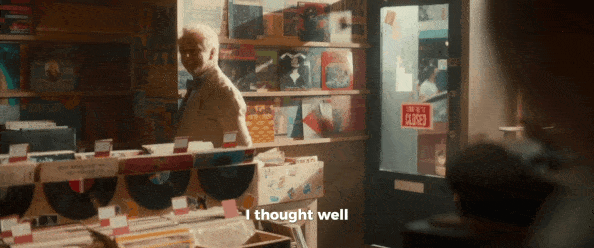
In order to talk about the parrots on Maggie's sweater, I think we first have to talk about the crows in the Job minisode and what the deal with the many birds on GO is in general. In S1, we are given a scene in which we learn that Crowley has changed his name from "Crawley" to "Crowley" and that doing so is a rejection of the "bit too squirming-at-your-feet-ish" snake-like name he had. We can see that he now appears to have swapped out snakes for that of a crow but we don't really know why. We know that this means something to Aziraphale when he learns of it in S1 but it's not until S2 that we get the Job minisode telling us the story. After, we can see more layers to the symbolism of birds in GO. When Crowley is tasked with killing the goats, he wants to save them, instead. The way he does so is to change their outward appearance to that of crows-- because the crows are not endangered by Heaven and Hell... because they're crows. Because they're birds.
Ironically, the same living things that angels and demons are like are the living things that, on Earth, are not usually seen as possessions of any one person because they live wild and free. Crowley can save the goats by turning them into crows because even Heaven doesn't see crows as possessions of Job.
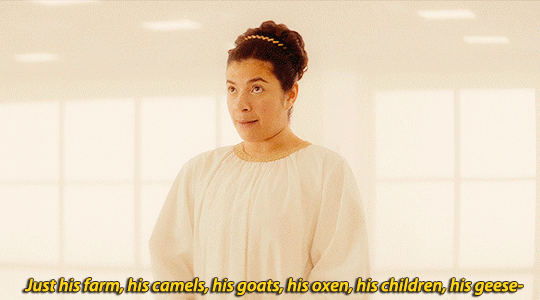
In the eyes of Heaven, all of these things belonged to Job-- he owned them. They were his possessions, the way that the coffee cup I'm sipping from while typing this is my possession. Aziraphale correctly objected to Job's children listed alongside his farm and his animals-- and I'm sure he didn't view them as Job's possessions-- but his objection to Heaven was over a sense not wanting to murder children. While that is obviously a good thing, at no point is Aziraphale arguing the point that none of the living creatures on this list actually belong to Job in the first place. To argue this to Heaven would have been a bit fruitless at the time but I'm just pointing out the differences in approach here to this problem between Aziraphale and Crowley.
Crowley-- through unfortunate personal experience-- knows what it's like to be a living being whom another views as a possession and so it's him who finds the loophole. He can save the goats if the goats don't look like goats or anything else that anyone considers Job's possessions. What can't be killed because they don't belong to Job? Birds. The crows that belong to the sky. They fly free. In the end, Crowley takes Job's house (which can be rebuilt and is inanimate) and he drinks Job's wine (the Earth produces more) and the already-dead ox was Aziraphale's dinner (and the inspiration to save Job's kids the next day via the ox ribs). That's it.
The moment that Aziraphale learned how Crowley saved the goats by masking them as crows is also the beginning of the two of them developing a hidden way of communicating with one another-- a coded birdsong that they make reference to in connection with another kind of bird... nightingales. Demons are traditionally aligned with goats so Crowley changing his name and telling Aziraphale that he's taken on this name that only the two of them understand is showing that Crowley sees this metaphor himself very clearly and that he views himself as a free-flying crow, even if he has to pretend to be a demonic goat of Satan. He belongs to himself but he chooses to share that self with Aziraphale, who is the only other person who knows what his name truly means and who he really is.
The ironic thing about all of this is that angels and demons are basically already bird-humans in how they present, right? They can shapeshift to whatever they wish to be but when we see them, they are, by and large, in a human-like form and/or with wings and the ability to fly. So there's an irony to birds then representing freedom because, as we have seen, the angels and demons are as trapped as their human parallels can be at times-- in toxic relationships, with themselves and/or with others, and looking for the same peace found in kindness and love.
Maggie and Nina are both blended parallels of Crowley and Aziraphale. They each represent different aspects of Crowley and Aziraphale's stories. Their costumes blend colors and symbolic stuff related to both characters at once and it's not just the parrots worth a look in Maggie's first outfit in S2:
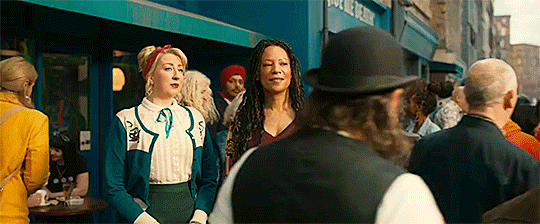
While Maggie resembles Aziraphale a bit and wears his blue and white colors, she also has a red head wrap on that bumps up in the middle (and she has an orange one that does the same thing in her scenes with Aziraphale early on, when she's also in a Crowley-and-Aziraphale-blended orange tartan shirt). It's a nod to Crowley's red hair and perpetual pompadour. Her blouse also ties in a ribbon that hangs down and matches in color and shape to the snakes on her sweater, echoing serpent Crowley and his ties.
(We aren't focusing on her outfits in this meta b/c you asked about Maggie but look at Nina in the same scene in the above gif-- her cardigan is yellow, brown, red, pink and black. Nina's sweaters all season long are if you threw all the Ineffable Husbands' colors onto the same garment.)
If you notice, the parrots on Maggie's sweater are upside down and their tails are actually right-side-up hissing snakes. Overlaid between them and connecting them are daisies, which is actually an wordplay thing related to the etymology of Maggie's name. Maggie comes from Margaret, which means "pearl", as it comes from the Latin word for what we today refer to as "pearl", which is margarita. The daisy's formal name is "F. Marguerite" and is named as such because of daisies being seen as "the pearls of flowers."
Almost all of the possible nicknames or variants for Margaret/Marguerite/Margarita are also featured in Good Omens at different times to date, with the exception so far of "Rita." [Though they have cast Harry Potter's Rita Skeeter lol but that doesn't count.] Maggie uses the most common one as her first name. "Daisy" is also sometimes a nickname for Margaret, in keeping with the etymology I mentioned above. Fraulein Greta Kleinschmidt's first name is a nickname for Margareta; the French restaurant on Whickber Street is named Marguerite's. Aziraphale's magic words, one level of which is with relation to his and Crowley's relationship, also has a sly use of another, common nickname for Margaret, with an oyster-ish connotation, among other things:
"Bananafish, gorilla, shoelace, with a dash of nutmeg."
A pearl is a gem produced by the combination of outside matter mixing into the nacre within a closed shell of a mollusk or other bivalve, especially that of the oyster. Oysters, of course, have relevance to Crowley and Aziraphale's relationship, as they are the focal point of their conversation in Rome, which is pretty heavily suggested (in that scene and others) to be when they started sleeping together.
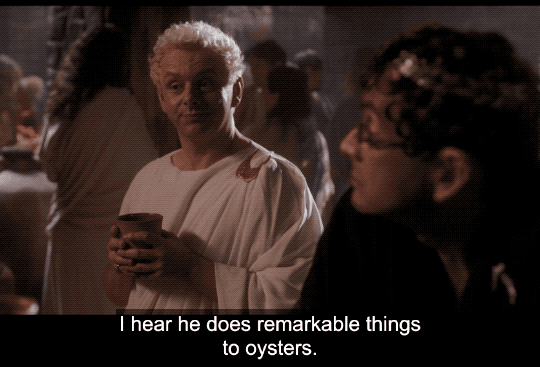
Maggie is also seen wearing her namesake pearls during The Ball and into the Final 15, when Aziraphale puts her in what appears to be a pearl-buttoned (and maybe pearl-trimmed) blouse. She is memorably wearing that when some other visual wordplay comes into being-- when she becomes a bird (in the sense of slang for English woman) who gives Shax "the bird":
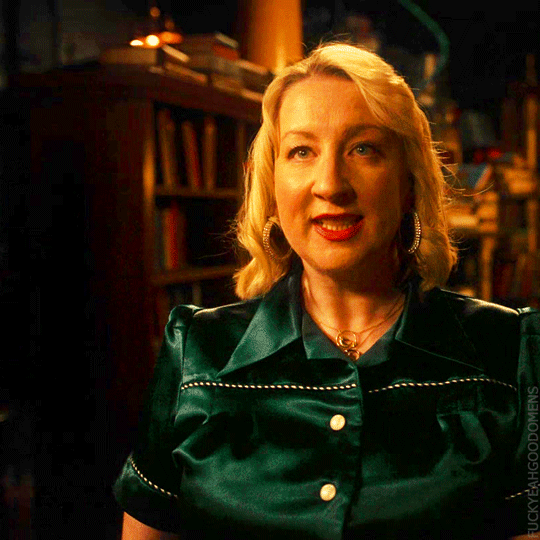
Maggie's other sweater, worn after the parrot/daisy/snakes and during her Crowley-arranged kinda-Vavoom, is mustard in color and features two women and music notes in the same, dual positions of the parrot/daisy/snakes on her first sweater. It draws a comparison between being a bird in the human sense-- a woman, a person-- and being a bird and a snake and a daisy and a pearl... it's a nod, imo, to GO's comparison of other living things that exist in nature to the experiences of the human and human-like characters in a way that a certain Nina Simone song does to beautiful effect, as we'll look at in a second.
Parrots are among the world's most caged birds, though. They're fascinating and kind of eerie because, as you pointed out in your Ask, they have the ability to mimic people. (So can some crows, btw.) Parrots are unique among birds because they actually lack the ability to distinguish between birds and other living creatures. Most birds know the bird songs of their kinds and sing them to one another. Parrots, crows, mynah birds and a couple of others are capable of learning to imitate it and the reason why they do is as a survival imperative.
In the wild, birds like parrots flock together and trade off responsibilities. Sometimes, they're looking for food; sometimes, they're safe-guarding the flock. It's impossible for one parrot to survive on their own so they use their vocal skills to fit in with the flock. This is why parrots are chatty and why they'll try to imitate the words of people in a household (and just any sounds around them) if they're kept as a pet-- they're trying to fit in to survive. They just don't see any difference between other parrots and other beings, including humans-- it's just all the same flock.
Sound like a certain lovely record shop owner we know?
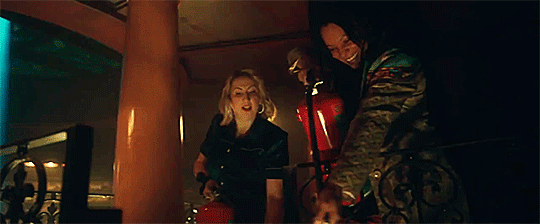
One of S2's biggest surprises is that when the events of The Meeting Ball reveal to Maggie and Nina that Crowley and Aziraphale are not technically human, Maggie takes it surprisingly well. (Nina, out of fucks to give about anything and deciding to throw her lot in with Maggie, is also game once she decides to stay and join this weird af family.) The reason why Maggie doesn't care what species, exactly, Aziraphale is is because she already knows what's in his heart.
He's always been good to her. He's like her family. He's a kind person and her friend and he's in trouble. Maggie does for Aziraphale what he's always done for her-- try to make him feel like he's not alone. Whoever the people are at the door are, Maggie is willing to help and, for the first time in the series-- because of Maggie-- we have the supernatural and the human beings teaming up. It's her and Nina and Gabriel that are protecting the upstairs private residence of the bookshop and keeping the demons from getting in there. They stand up for Aziraphale and they do so because of Maggie's decision that they should. She parrots the kindness that Aziraphale taught her and accepts him and his partner and his weird angel brother lol as all part of the same flock with no second thought because she's lovely like that.
Parrots, though, are some of the most caged and tormented birds in the world. Maggie's negative self-talk and her unfortunate circumstances at the start of S2 are leading her down a dark path when we first meet her. She says she didn't go to parties-- she wasn't "that kind of teenager"-- implying that she had a hard time growing up and a probable history of being bullied. We never meet any other family that she may have or have had and she goes to Aziraphale for personal advice, implying that she might have a difficult family situation as well. Her business was struggling and she was depressed when we met her. When Shax begins to, well, parrot Maggie's inner thoughts aloud during The Meeting Ball, though, it's pretty horrifying. Maggie thinks herself "unloved and unlovable." She's so cruel to herself.
The self-image we're presented with that Maggie has for herself doesn't match at all what we've seen. The Maggie we've met is kind, gentle, honest and funny. She runs an insanely cute record shop. She's artsy and has a lot of style and great taste in old films and music. She's smart and she has a lot of love to give. Maggie isn't perfect. She's a little judgy (let Nina drink her wine in peace lol) and she gets in her own way when it comes to trying to connect with others sometimes. No one is flawless, though, and if those are someone's worst traits, then they're a really good person.
Maggie is a trapped parrot, though, at the start of the season. She is boxed into her life. The debt forgiveness from Aziraphale helps to set her free a bit and we can see the life she would like. Everyday, she looks across at freedom for her-- a romance with the owner of the American-themed coffee shop across the street. Symbolically, Maggie wants love and freedom-- from her own negative self-image and from what's keeping her feeling down about herself. Crowley and Aziraphale do actually help her with that-- they free her from debt and help her connect with Nina. (They might have actually overshot the mark a bit because she's so confident by 2.06 that she can't wait to give love life advice to *checks notes* a millenniums-old Cupid but that's another meta lol.)
Maggie brings Nina a Nina Simone record because they share a name but that's not entirely why. It's really because Nina Simone sings in "Feeling Good" of the whole world being a bold world and a new life of feeling good that Maggie desperately wants.
Like in "Feeling Good", Good Omens uses the other living things on Earth as metaphors for human experience-- which is also what the supernatural characters are. Birds can be caged but learn to-- and are meant to-- fly free and birds can be the humans or the supernatural creatures because, really, Maggie is correct-- they're all the same flock. Birds flyin' high/You know how I feel... fish in the sea/you know how I feel...
These creatures exist free in nature and know no emotional turmoil, just peace. They are free from inner turmoil and can just live and love and be in the moment-- what we're all searching for, really. Peaceful, precious, fragile existence, as Crowley put his life with Aziraphale, even if much got in the way of it in S2. S3 will hopefully see some of the fragility of it fall away for them. For Maggie, it's already begun to.
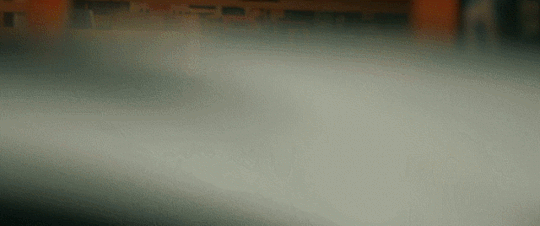
Sleep in peace when day is done/That's what I mean/And this whole world is a new world/Is a bold world/for me...
youtube
#ineffable husbands#good omens#crowley#aziraphale#aziracrow#good omens meta#good omens 2#good omens theory#maggie good omens#nina good omens#maggie and nina#ineffable wives
30 notes
·
View notes
Text
A list (non-exhaustive) of why the 1941 flashback scenes are haunting both me and The Narrative, Part 2:
(link to Part 1)
6. There are additional scenes that point to 1941. The Ritz scene from S1ep6 where they toast “to the world” also echoes the S2ep4 1941 scene, because these are the only two instances where we see Crowley and Aziraphale “cheers” to something with their drinks and then take a sip at the same time - they are also the only two instances where they both consume the same substance at the same time.


(To contrast, look at the Rome flashback from S1ep3, in which they also “cheers” but only Crowley takes a sip of his drink afterwards. In fact, if you watch the entire Rome flashback, there’s never a time when their sips synch up.

I could go off on a whole other tangent about the peculiar significance of “ingesting substances” within Good Omens and how it serves as a direct metaphor for acquiring knowledge/losing innocence, vis a vis Eve and the apple, and Aziraphale with the ox rib, but that would be adding at least a few more paragraphs.)
There’s another element that famously features in the S1ep6 Ritz scene, a piano cover of “A Nightingale Sang in Berkeley Square.” If we operate on the assumption that we’re meant to link these two events as well, then an inference that the song also played a role that night in 1941 now seems less like a leap, and more like a logical step.
7. We also can’t leave out the context clues within the S2 1941 scene itself. I’ve already mentioned the gramophone and the wine, but there’s another element in the scene’s background that seems to be hinting at something:
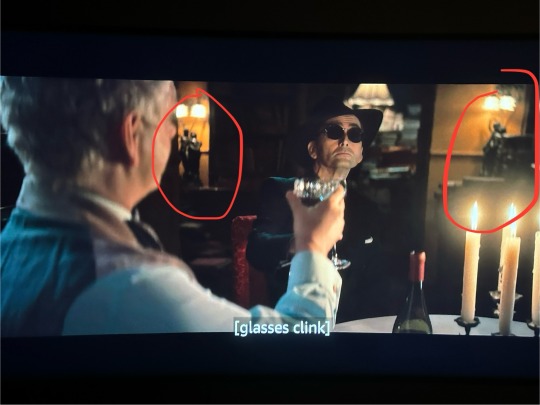
The lamps. Despite the candles on the table, there are lit lamps in the background. Again, the background is out of focus, but the lamps seem to be human figures, and they appear as though they might be dancing couples. Why have these lights turned on if you have candles lit? Our attention is meant to be drawn to these light fixtures in this moment; it’s possibly more foreshadowing.
(Of course, you could also turn it the opposite way and say the audience is meant to ask: why light candles when the lamps work just fine, for which there is very little explanation other than Aziraphale was actively trying to create romantic ambiance. Which would only add to the suspicion that something more may have happened between them in 1941 that the first two seasons left out.)
8. Chronologically speaking, the next time we see Crowley and Aziraphale together after 1941 is in 1967, when Aziraphale pops in on Crowley in the Bentley. One of the most striking things about the 1967 scene is that the emotional tone has shifted rather dramatically from what it was like at the end of the S2 1941 scene.

There’s awkward tension between them; every line of dialogue carries heavy hidden meaning. The repressed longing is palpable. Crowley is subdued and cautious, and Aziraphale is avoiding Crowley’s eyes and speaking in a stilted voice.
It could just be the subject matter that’s making things awkward - the holy water had been a matter of major contention between them - but there seems to be much more to this tension. We pay a lot of attention to “you go too fast for me, Crowley,” and we should (especially given that when Aziraphale is actually able to look directly at Crowley in this scene, he keeps glancing at his mouth), but there are other bits of dialogue that are important there too.
Crowley offers to drive Aziraphale “anywhere he wants to go” and Aziraphale turns him down. But from information we received in S2, we now know that the bookshop was literally across the street. We are being implicitly told that Crowley is offering a whole lot more than just a drive home, but we are also being primed to recall the last time Crowley actually did give Aziraphale a ride home, the last time they were in the bookshop together. Every context clue is contributing to the sense that we are missing something. The 1941 scene still feels incomplete, like there’s one last installment of it, which sets the stage to revisit it in S3.
9. Returning to the 1967 scene, after Aziraphale hands over the thermos of holy water, Crowley asks whether he should say thank you. Aziraphale responds with a grimace disguised as a polite smile and a rather curt “better not.”
This contrasts to 1941, when Aziraphale attempts multiple times to express gratitude to Crowley for saving him and his books, and for coming through for him at the magic show, including that rather suggestive moment in the Bentley where he insists “there must be something I can do for you…in return.” Why is the idea of expressing gratitude so loaded and weighty, when only twenty years ago (not that long, for them) Aziraphale insisted upon it? Gratitude has always been complicated for the two of them, but now that complexity feels compounded.
It gives extra interest to the moment Aziraphale thanks Crowley for removing the paint stain from his coat in S1ep2. And of course, we know what happens just a bit later in that same episode.
The Wall Slam, which echoes The Kiss, in that Crowley is the one to close the distance between them in both cases, taking Aziraphale by the collar.
It’s interesting to note that there have also been other times when Crowley gets into Aziraphale’s personal space. In the first two minisodes in S2, there are two separate instances of Crowley getting into Aziraphale’s face after the angel accuses him of goodness.
It happens in Job’s courtyard in S2ep2…

…and in the graveyard in S2ep3 after they (well, Crowley mostly) save Elspeth.

This is another of their patterns - Aziraphale acknowledging the good in Crowley, casting doubt on his evilness in a way that gets a rise out of the demon. At first it was unintentional, but Aziraphale tries to bait Crowley in this way multiple times throughout the series, possibly as a way to get physical closeness with him that he doesn’t get otherwise. The time in Job’s courtyard wasn’t intentional, but the time in the graveyard definitely was. Just look at Aziraphale’s pleased, indulgent expression when Crowley is telling him off.

Sometimes this tactic is successful, sometimes it’s not. One could argue that the Wall Slam was an instance in which he was very successful, even more so than he bargained for.
And: he attempts the same thing multiple times in 1941. He does it immediately after the church gets bombed, in the Bentley afterwards, and during their candlelit date. Crowley doesn’t really rise to the bait though. He gets a bit snappish, he dismisses and denies, but he doesn’t get into Aziraphale’s face - and my read of this scene is that you can see Aziraphale’s frustration that it isn’t working.
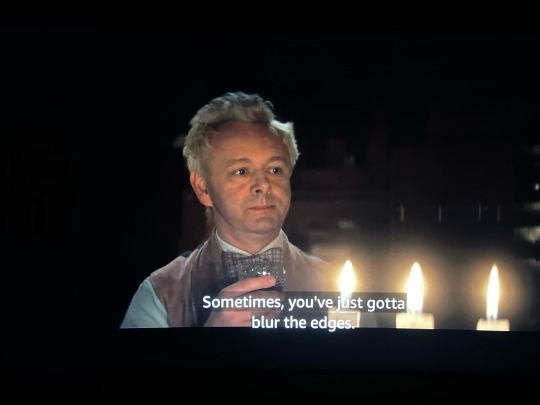
Aziraphale can be very stubborn when he’s decided to do something, and if he keeps pushing this particular button of Crowley’s to get the response he’s seeking, well. It wouldn’t be the first time. I could definitely see him trying this tactic one more time if we do get a continuation of 1941 in S3, and it potentially working.
There may be a part three to this, as I have a few more related items to discuss. (Shocker, I know.)
#good omens#crowley#aziraphale#ineffable husbands#good omens 2#go meta#media analysis#good omens meta#good omens spoilers#good omens 1941
26 notes
·
View notes
Note
I feel like I'm the only one in the Good Omens fandom who doesn't get the subtext behind the "aim for my mouth but shoot past my ear" quote. Do you have thoughts to share on what it means to you?
Ooooh do I. This is probably one of my favorite lines in all of Good Omens. And that is saying something because I'm one of those with an old dog-eared copy of the book AND the S1 script book, both full of underlines (don't tell Aziraphale, he'd be horrified). So, here is my unhinged passionate explanation of what that line means to me, and how I think it actually applies to multiple moments through S2, specifically moments where there is some kind of performance/deception taking place. I will try to keep this only marginally long, so I will break down the three moments I think are MOST important, and then sum it all up at the end. Ready? Here we go!
What the line means in 1941

"Aim for my mouth but shoot past my ear" clearly applies to the mechanisms of the bullet catch in S2E4, so let's start there. What does the bullet catch tell us about their relationship? First, they are always being watched. By humans (the audience) but also by their respective sides (in this case Hell). Second, they have to pretend they don’t know each other but still have ways to communicate throughout their charade. Third, they HAVE to trust one another. Like, a LOT because - Fourth, their relationship puts them both in danger.
In this context, the line is really interesting because the idea of aiming for the mouth and shooting past the ear can also be interpreted as speaking and acting in ways that either pacify or confuse those watching, but that clearly communicate to one another. There is SOMETHING about the fact that in the presence of the Nazis Crowley speaks very plainly but in a way only Aziraphale would REALLY understand - “If the bomb does land here, it would take a real miracle for my friend and I to survive it” - yet when they are being watched unaware the line that the Nazis manage to get is “banana, fish, gorilla, shoelace with dash of nutmeg” because never, not even alone, do they speak in a completely straightforward manner. This does not mean they do not communicate, it means they communicate in their own language.
What the line means in Job
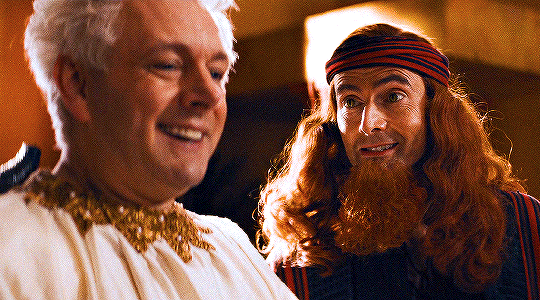
But wait! There is MORE! Because 1941 isn’t the first time we’ve seen these two perform for an audience! "Aim for my mouth but shoot past my ear" also applies in Job. There is one big difference - at the start of the story, Crawley is performing alone. He is saying all the right demonic things - "I want to. I long to destroy the blameless children of blameless Job, just as I destroyed his blameless goats." And at first, Aziraphale is in the audience, unaware of the sleight of hand taking place in front of him. But Crawley offers to read him in by showing him… the crows. And Aziraphale ends up stepping into the roll of magician’s assistant as Crawley works to save Job’s kids, human and otherwise.

What I find interesting is the way you can think about mouths and ears here - Crawley lets him hear the crows bleat (shoot past my ear) which lets Aziraphale understand who Crawley really is. Then Crawley offers him the ox rib (aim for my mouth) which in some ways makes Aziraphale begin to actually examine who HE is. Both are necessary if they are going to eventually become An Us, and it really starts here, with Job.
What the line means in the Final Fifteen
By the time we get to present-day S2 “Aim for my mouth but shoot past my ear” has taken on such a deep meaning for these two man-shaped beings. Their communication is so rich and layered, where they speak in metaphors and puns and have rituals like the I Was Wrong dance. I mean, just look at this silly little act of love -
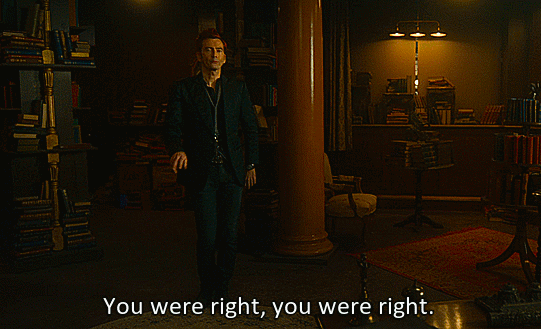
I. Simply. Cannot. These two! They deeply enjoy one another. BUT this very complicated language they have developed together only works when they are ON THE SAME PAGE.
What happens in the Final Fifteen? They stop speaking the same language. For the sake of this analysis, we are assuming that Aziraphale is feeling threatened, and is aware that Metatron has ill intent, okay? Okay. In that context… just like 1941, they are AGAIN being watched (this time by Heaven), pretending they don’t know certain things about each other, need to trust each other and their relationship has put them in danger. But here is the kicker - they have slipped back into their roles from the start of Job, except reversed. They don’t have the same information and awareness. Fell the Marvelous is desperately putting on the performance of his life, and Crowley doesn’t even know they are on stage. There was no time for a backroom conversation to discuss the finer points of the trick. In the end, Crowley decides “fuck shooting past your ear, you aren’t hearing me."

And in the MOST devastating way possible, these two aimed for the mouth and shot right past each other's ears. Ouch. OUCH.
*Clears throat, dries eyes* in summary, this little line of poetry does a heavy lift for S2. It applies to scenes where a performance/sleight of hand is taking place, but it reads differently in each one. Importantly, "Aim for my mouth but shoot past my ear" only works out when they are properly partnering not pretendy partnering. If there is information withheld, or they aren't in agreement (this applies to Edinburgh toooooo) things just implode. They have to have TRUST for this to work.
Just in case I seem even remotely normal at this point, here is the little poem I wrote after watching S2 the first time, as the brainrot started to take real hold:
aim for my mouth and shoot past my ear
tell me the lines but show me your eyes
so i learn how hearts can hide truth in lies
here beside you
aim for my mouth and shoot past my ear
i promise to burn you if you hold the match
you walk through fire but i'll turn to ash
a shade grey for you
aim for my mouth and shoot past my ear
show me the words i can't seem to hear
give me something to hold as i go through my fear
and here return to you
#aim for my mouth but shoot past my ear#good omens meta#ineffable idiots#good omens brainrot#its the poetry of it all that kills me#emily dickinson would approve
78 notes
·
View notes
Note
love how the ox ribs scene in s2 makes the 'slither over and watch you eat cake' even more horny in retrospect (as if it wasn't insane already). like yeah likely thing to say for a demon who singlehandedly invented several new kinks in a span of one night after watching an angel go crazy on an ox rib..... also neil was insane for writing that. valid but insane
Literally likely thing to say for the guy who invented the hunger as sexual desire metaphor by having an angel devour an ox
35 notes
·
View notes
Note
hi! you made a comment about the aziraphale eating meat scene being like, sex scene camerawork, do you mind elaborating?
hi! I'm guessing it's my tags on this post?
I'm not an expert or anything so I'm not sure I'm really the best person to break this down but I can elaborate a little (screenshot-heavy post coming up - click to enlarge)
the linked post already talks about the metaphor of Aziraphale giving in to carnal desires and bodily pleasures with Crowley, which speaks for itself ✌️
but this is also filmed very much like a sex scene (or like, a love-making scene, really):
the lighting is a big one. the main light sources are the candles, giving us warm, flickering light casting soft shadows over the characters, who are often lit from the side or behind:

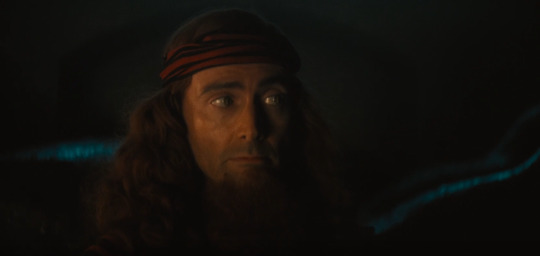
there are candles around the pillar behind Aziraphale and presumably some to the side, the same ones Crowley's face is lit by. the light seems even warmer in the screenshots below (yes i chose this screenshot specifically because it is certainly also a choice to have so much focus on Aziraphale licking the meat before eating it) (also notice how they really amp up the lightning and thunder outside once he starts eating. wildness of nature being let loose)
there is nothing more romantic than candlelight and even though these men are covered up to their necks, the lighting makes their skin look soft and warm, very typical of love scenes (of course they act it out like a seduction too)
then we have positions and camera angles. we might as well call this "blowjob angles" - Crowley is reclined on the sacks and is largely filmed from, well, below, so that we look up at his face:
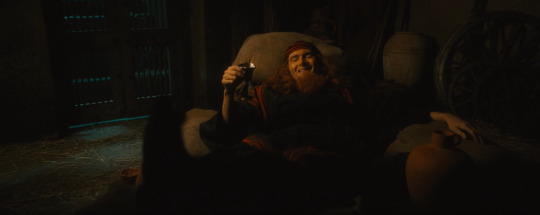

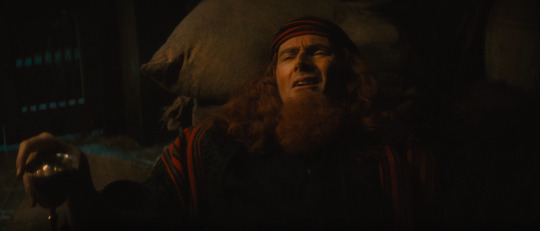
meanwhile, Aziraphale has his back to the camera with something big, warm, and meaty in front of him, which he goes to town on sloppy style, face shining with grease and meat sweat and all, and he has his mouth full for a lot of the conversation:

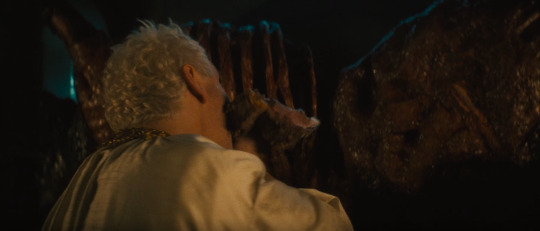

and jfc Aziraphale DEVOURED that ox, look how intact it is before he gets started, and how later he has CLEANED those ribs (also red red red colors - red stripes on Crowley's clothes, red on the ribs also creating "stripes" in the frame, you could replace one with the other):
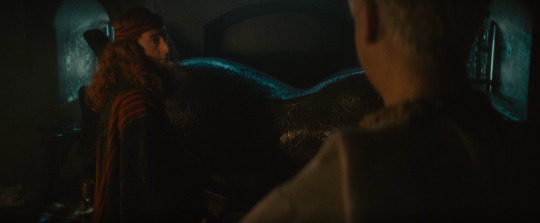
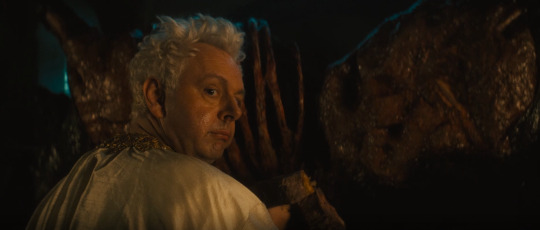
(I could also go into how Aziraphale is in a long, white gown (wedding night/virginity) and his nervousness for the consequences/going to hell by the end of the episode, but that could be taken to a level of discussing religious indoctrination and its effects on relationship to sex that I think others can do better than me)
I think these were my immediate thoughts, though you could probably go a lot more into it ✌️
so in conclusion, this post 🤸
#asks#veggiesforpresident#good omens#good omens s2#good omens spoilers#gos2spoilers#good omens meta#i guess#good omens 2
87 notes
·
View notes
Text
Deep dive into The Coffee
The following is primarily about the symbolism of the Metatron's coffee.

Once I started thinking about it, there's a lot of cool stuff going on there (depending on whether you think, you know, symbolism is "cool," but I do!).
I think it points toward certain interpretations of what the characters are feeling and what their motivations are, but it isn't about the coffee itself affecting the plot beyond the obvious (it's a love-bomb the Metatron is using to seem friendly).
I was thinking about The Coffee as a sort of shadow version of the Fruit of Knowledge and wondering: why the heck would you choose coffee for this symbolism? It's obviously a very common, non-suspicious beverage in Soho, but surely they could come up with some creative reason for the Metatron to come bearing pretty much any edible item. Out of all the foods and beverages in the world, why coffee? Why not, for example, fruit, or Eccles cakes, or meat - or, for that matter, tea, or cocoa, which we already know Aziraphale enjoys?
But it does make sense. And it also makes sense that it's not just a cup of coffee, it's an oat milk latte with a dash/hefty jigger of almond syrup.
Here, I'll be making the big assumption that the Fruit of Knowledge is relevant to Aziraphale as a metaphor - as something he would consider desirable but forbidden. He was supposed to be guarding it in Eden ("technically, I was on apple tree duty"). And Crowley, with his red hair like the apple, has spent the past 6000 years trying to impart the knowledge of "good" and "evil" to Aziraphale, who in turn has desperately wanted Crowley and also considered him off-limits. Crowley is Aziraphale's Apple of Eden.
Here are a few observations about The Coffee, contrasted with the Fruit of Knowledge and, in some cases, the ox ribs.
The coffee is heavily processed - Fruits, including the apple in Eden, exist straight from the natural world in a form that you can pluck from a tree and eat almost whole. Meanwhile, coffee has to go through a lot of processing between the time it's a coffee berry (also a fruit!) and the moment it's recognizable as the beverage so many people immediately reach for every morning. There's a long, often-unethical production chain there, involving many people.
The oat milk latte with almond syrup is further complicated. The apple is plain and straightforward - it simply is Knowledge in fruit form. It's "pure." The coffee was already heavily processed to become coffee, and now multiple other ingredients have been added. A fancy latte beverage involves the preparation of the milk and the syrup in addition to the coffee beans.
There's a lot going on behind the scenes here. There may, as Crowley pointed out, have been a lot going on behind the scenes in Eden with the Apple purposely placed for the humans to see, but it still feels like there's significance to the difference between a thing that springs from the ground as a food item and a thing that has to be processed over and over before it's ready to consume.
Maybe the point is that the Apple of Eden did exactly what it was said to do from the beginning - gave Adam and Eve Knowledge one way or another - whereas the coffee is a heavily-altered, almost unrecognizable version of the truth.
The coffee is heavily sweetened with additives - This is the real important part for me. Fruit is, broadly speaking, naturally sweet. This obviously varies from piece to piece, as anyone who's sorted through a pile of fruit at the supermarket would know, but the most widely-understood appeal of fruit as a concept is its sweetness. Without any other input, we could guess the Fruit of Knowledge was pretty sweet, too.
Meat, ox ribs, are very different from fruit, obviously. Savory and a bit salty. But they are another food item with broad appeal.
Coffee, particularly espresso, is naturally bitter, to the point where drinking it black is often an acquired taste. The Metatron picked a particularly sweet type of milk and a sweet-flavored syrup.
He had to sweeten his deal a lot to make it palatable to Aziraphale.
The coffee is not "of the flesh" - There are no animal products listed in the ingredients to the Metatron's latte. It's vegan. Oat milk is plant-based. Almond syrup is a plant flavor, likely made with sugar, also a plant. Coffee is a plant.
Aziraphale's other major culinary experience this season? The one where he become more worldly, more of-the-flesh? Yeah, the ox ribs. Meat. The latte is, I suspect, the Metatron's subtle rejection of that worldly pleasure.
The coffee is not Aziraphale's usual preference - We've never seen Aziraphale drink coffee before. We've seen him drink wine and tea and hot cocoa and champagne and sherry, but never coffee; in fact, Crowley's espresso order seems to be set up in contrast to Aziraphale's taste. And when the Metatron brings it to him, Aziraphale initially hesitates. To be fair, I do read his enjoyment of the latte as genuine. I don't think he was lying when he said it tasted good. But he only drinks it after an awkward push from the Metatron.
The coffee contrasts with Crowley's espresso - Season 2 is bookended by espresso beverages. At the beginning, Crowley enthusiastically downs an absurdly hype-inducing, bitter concoction of six espresso shots all in one gulp to prepare for whatever weirdness is waiting for him in the bookshop. He doesn't seem to care either way about the taste. At the end, Aziraphale hesitantly sips his heavily-diluted, sweetened espresso under social pressure. He does admit he likes the taste.
Give Me Coffee Or Give Me Death - The Metatron points out the name of the coffee shop, which possibly sets us up to consider that a choice between anything and death isn't really a choice at all. He also muses that people are very predictable for always choosing coffee over death. This is all done outside of Aziraphale's awareness. Maybe that's because the coffee vs death thing is more about the Metatron's underlying motivations - to coerce and force Aziraphale to accept his role in Heaven no matter what - than about something Aziraphale is consciously aware of.
So, since I'm theorizing that the coffee is a metaphor for the Metatron's offer, here's what I think it's hinting toward.
Aziraphale's emotions and motivations:
Aziraphale didn't start that conversation with any interest in what the Metatron was saying. Coffee's not his order. This didn't start out as a successful temptation, per se. It was a coercion that appeared harmless on the surface (drink the coffee/entertain the conversation to be polite).
Now that they've had their conversation, Aziraphale did like some aspects of the Metatron's offer. That part is a successful temptation.
If we assume Aziraphale really liked the coffee and then run a parallel to the Metatron's offer, it's not hard to see what sufficiently "sweetened the deal" for him: the offer to bring Crowley to Heaven. The Apple of Eden, Crowley, gave Aziraphale the knowledge of good and evil; the sweetened coffee - the suggestion that Heaven could change its mind about Crowley - once again obscured it.
All that stuff about Heaven being the side of Truth and Light and Good came out because Heaven appeared to be changing its mind about Crowley. Crowley is kind of symbolic of everything on Earth for Aziraphale, so presumably, if it can change its mind about Crowley, then it could do things better for Earth, right? Heaven's good intentions must have been sincere after all.
The Metatron's offer and underlying plan:
The Metatron has a complex plan. He's manipulating a lot of people, not just Aziraphale.
The Metatron is using sweetness to conceal a bitter plan that he knows Aziraphale will find unpalatable (separating him from Crowley).
The Metatron is going to present going to Heaven as a choice, but it isn't really one.
For some reason, the Metatron does need Aziraphale back in Heaven, and it's easier if he comes willingly, perhaps if he believes it's his own choice. They're not going to send a bunch of disguised Archangels to abduct him this time.
The Aftermath
So, Aziraphale has been taken in by the coffee, the Foisted Fruit, although the Metatron was not actually giving him a choice at all. Aziraphale botched the philosophical talk, but his choice has probably put off something worse.
Note that in the Final Fifteen, Aziraphale essentially tries to present the same temptation he fell for to Crowley: we can be together in Heaven.
But unlike what Adam did with Eve, Crowley rejects it, because he sees right through it. Instead, he counters with the truth about Heaven and the truth about his own feelings, both in verbal form and with a kiss, once again reprising his role as the Serpent of Eden and the Apple of Knowledge.
Aziraphale, having already swallowed the belief that Heaven is capable of changing, feels Crowley's attempt to disillusion him is a betrayal, an attempt to stop him from doing Good. Notice how when Aziraphale touches his lips longingly after the kiss, he finishes by looking angry and wiping, as if to dismiss what's been shared with him. But you can't un-eat fruit. And you can't be un-kissed.
The Metatron comes back while Aziraphale is clearly having a crisis of conscience. Try as he might to wipe the kiss away, it happened. And he heard the things Crowley said. And he keeps glancing toward Crowley.
This is a tricky moment in the Metatron's plan, because the sweetener he used to get Aziraphale to "drink the coffee"/accept Heaven is no longer in there with Crowley out of the picture. He rushes in and pushes Aziraphale to start his new job, dismissing Aziraphale's excuses. The fact that the Metatron needed Aziraphale without Crowley was the bitterness in the plan that he had to disguise with sweeteners.
Aziraphale, left without sufficient time to think, resolves to simply not think about his first choice, the choice that just walked out the door.
And then, at the last second, to ensure Aziraphale gets in that elevator, the Metatron reveals that the next step in the Great Plan is the Second Coming. Why reveal it at the last second, when Aziraphale is going to get on the elevator anyway?
Because it's the clincher. The Metatron knows Aziraphale won't be able to resist trying to make a difference.
He needed to divide Aziraphale and Crowley. He needed to get Aziraphale's hopes up about being able to make a difference with Crowley first. Then he needed those hopes dashed harshly so that Aziraphale would be at a loss, susceptible to joining Heaven to find a purpose again, now that Crowley is out of his life and the bookshop is being looked after.
And now, by emphasizing Aziraphale's knowledge of Earth and telling him the plan to destroy it at the same time, the Metatron gives Aziraphale a whole new purpose: thwart the Second Coming.
This has been the "predictable" part that the Metatron was scoffing about in the coffee shop. He knew that chain of events would happen. He knew Crowley would reject any suggestion of returning to Heaven, and he knew that would leave Aziraphale upset and vulnerable enough to be swept away, and he knew saving Earth would matter to Aziraphale.
THIS is the moment Aziraphale realizes he's choosing between coffee and death. He has to choose the coffee, of course.
But Crowley has rejected Heaven. He hasn't rejected Aziraphale. He's still there.
And Aziraphale looks back at Crowley the instant he's told Earth is in danger again. You can be confused, but you can't un-eat the Apple of Knowledge. He hasn't forgotten.
There is an alternate reading here: Aziraphale lied about enjoying the coffee, and he is also lying about his beliefs about Heaven being genuinely good, and he recognized that he was choosing between coffee and death way earlier, during the conversation when the Metatron brought up Crowley. I like that reading, too, and it would indeed change the flavor of some of the things that happen afterward.
But either way, we reach the same point at the end of the episode. That grin in the elevator? Maybe that's Aziraphale realizing he's going to have to be unpredictable, just as Crowley said he could.
50 notes
·
View notes
Text
Job flashback and foreshadowing?
I - Starting Assumption
First off, you must understand that this only follows based on my idea that there is a bit of Crowley going up to heaven with Azi, in some kind of microscopically small version of the bookshop.
A literal... compartmentalization: the act of separating something into parts and not allowing those parts to mix together. (Cambridge Dictionary).
Literally, a safe place that Azi can go to in his mind and possibly where Crowley is hanging out. I also interpret Crowley's F15 line "You can't leave this bookshop." to apply here. Sorry, I just can't shake the idea that it is so very important that they stay together. Somehow.
Anyway, for how or when or if this happens, here there be gaps, so just jump over them for now, please, if you can.
II - Flashback and Foreshadow
With that starting basis in mind, I began thinking about the Job minisode. E2 is quite prominently all about Azi because of Companion to Owls, even Neil says it's important for Azi, especially, I guess, for his historical character development (as per Sendarya's beautiful video).
But I keep feeling like it could also be metaphorically foreshadowing what might happen to Azi in S3 and what he may have to endure. Job's house, the courtyard, Job's clothes all seem Azi-coded to me, with yellows and pale yellow-brown. And while Job's house is being targeted with destruction and the storm rages outside, Azi and Crowley are hiding out in the safety of the cellar, eating ox ribs and drinking wine, respectively.
My leap then, is that in S3, we might see Azi and Crowley (that is, my idea of the "half-Crowley") hiding out in Azi's mind's bookshop, taking shelter in this safe place protecting him from what could be going on "outside" of it: and that there is an attack on the rest of his mind: an attempt to erase his memories, his "him", his Aziraphale-ness.
I like to imagine that during this time Azi is doing some "stocktaking" and the two have another good heart-to-heart talk while they wait out this "tempest".
III - More Foreshadowing?
I remembered the E2 deleted concept art boards that Sendarya asked Neil about and which was answered by him confirming that they were meant for E2. Apparently one of those was going to be used to perhaps imply that the relationship then being forged between them was to last until the end of the world or something like that. Can't know because he reluctantly let it be cut.
You know the ones. Like this one.

It has now occurred to me that those could also have been a metaphorical depiction, a metaphorical foreshadowing, of Azi's mind having been wiped, or an attempt at it anyway. But that this "compartmentalized bookshop" survived and protected him/them.
IV: Misc
One last thing. When Bildad is talking to Job in the burnt-out barn, it sure looks like Job is sitting on a big steaming pile of shit...dung. As in, the dung pits that Demon Josh didn't want to get sent to again. As in, hell.
If I follow through with this train-of-thought it might imply that not only do they try to erase his memories, but they might also send him to hell as well? If so, it would be a good thing to have Crowley with him. As Crowley says to Azi when they are hunkered down in Job's cellar, "See you in hell." Poor Azi!
So, there ya go. Yes, lots of gaps, lots of leaps. And if this is the case, in the end how do we get them separated and each whole again? Adam? Jesus? God?
All I ask is that you please be kind to me and all my crazy talk. It's just an idea.
#go meta#good omens meta#good omens season 3#good omens s2#gos2#good omens job#a companion to owls#good omens
13 notes
·
View notes
Text
Gross Matter as Symbolic Sex in Good Omens
a sort-of meta
“I do not sully the temple of my celestial body with gross matter" - Archangel Gabriel at 13:36 of GO S1:E1. In this instance, gross matter means food. What does that mean with all the meanings food has taken on in Good Omens? Food in literature, and I’m including TV Good Omens under literature, is never just food. It tells us about characters - what they think is normal, what is available to them, their social standing, their backgrounds. Food also serves as metaphor, most famously (and relevant to GO) the forbidden fruit in the Garden of Eden, original sin. In the same tradition but with a very different meaning is the Eucharist, bread and wine standing in for the human flesh of Christ being consumed “for the forgiveness of sin.” Those are the big two in stories based in traditionally Christian traditions. Evil food = fruit, especially apples, and good food = bread, wine, human flesh.
Ironic that fruit has to rot before it’s morally pure.
Food is often also used to stand in for the things we can’t say with words. It often represents sex. Even in emojis, think about eggplants and peaches. Food is used to communicate sexual desire all the time. This is true in Good Omens too - Aziraphale’s tempting Crowley to oysters prepared by Petronius, famed Ancient Roman smut writer, suggests we should be looking for those meanings. Oysters were considered an aphrodisiac (substance that supposedly increases sexual desire and behaviour) a term which comes from Aphrodite, goddess of love, lust, pleasure, and procreation, who rose from the sea in a shell much like an oyster.
Take, Eat
Food is gross matter, and Aziraphale is strange for consuming it. “But you're an angel,” says Gabriel to Aziraphale in S1E1. Aziraphale doesn't need to eat. He chooses to. Food is something he enjoys (although he can't admit that to Gabriel in S1E1 - food is a forbidden pleasure). If Gabriel codes food as bad, as original sin, what does that say about Aziraphale? Aziraphale's enjoyment of “gross matter” is representative of his being tempted by a demon, and in the Job minisode we see that this is somewhat true. Crowley, the Serpent of Eden, did introduce Aziraphale to food. Unlike Eve and the forbidden fruit, Crowley did not do this as an agent of Hell. Crowley, when he suggested food to Aziraphale, was being friendly. This was also the scene where Crowley defied both Heaven and Hell and we see how little Gabriel understands of humans… and partnered activities like sex.
Food is also a partnered activity. When Aziraphale wants food, he also wants companionship. He was perfectly capable of escaping from the French prison himself, but he wanted Crowley to rescue him so they could go on their date and get crepes together. Food and companionship are linked.
Remember that food is gross matter. Is it the only gross matter serving this purpose? I don't think so.
Uriel describes the matchbox as a “material object” and they, Michael, and Muriel are surprised by its presence in Heaven. Material means having matter and like the “gross matter” of food was seen as unbefitting an angel, material objects do not belong in Heaven. They, especially Michael who is behind the desk, in a clear position of Heavenly power, are intimidated by it.
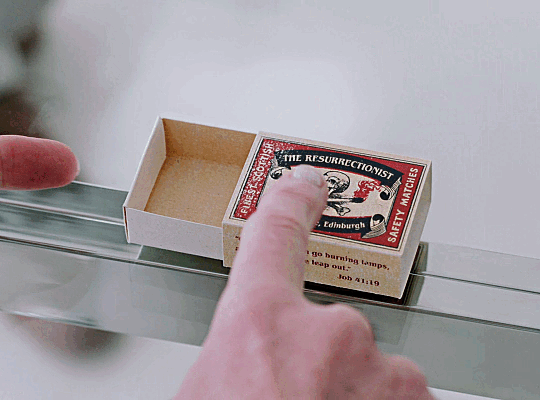
Of course, the matchbox is also gross matter in that a demon gave it to the angel they were interested in. Like Crowley offered Aziraphale an ox rib (which he ate in a very salacious manner - blowjob meat, anyone?) Beelzebub gave Gabriel the matchbox.
This is my Body
“This is my body, given for you, do this in remembrance of me.” Jesus at the Last Supper, quoted at the Eucharist
Beelzebub is Lord of the Flies. Their gift to Gabriel is a fly, an aspect of themselves, and they put it in a matchbox. We have the image here of Beelzebub inserting themselves into something which ends up in Heaven, and also of Beelzebub offering Gabriel a mostly empty box. A body and a body cavity. Their body and their body cavity, offered to Gabriel as gross matter, as a gift. This is my body, given for you.

Do this in remembrance of me. The fly contains Gabriel's memories (Gabriel entering the representation of Beelzebub's body) and when the fly (Beelzebub) enters Gabriel - when he takes their given body - he remembers.
The other box we see is the box in The Arrival, and in that box…
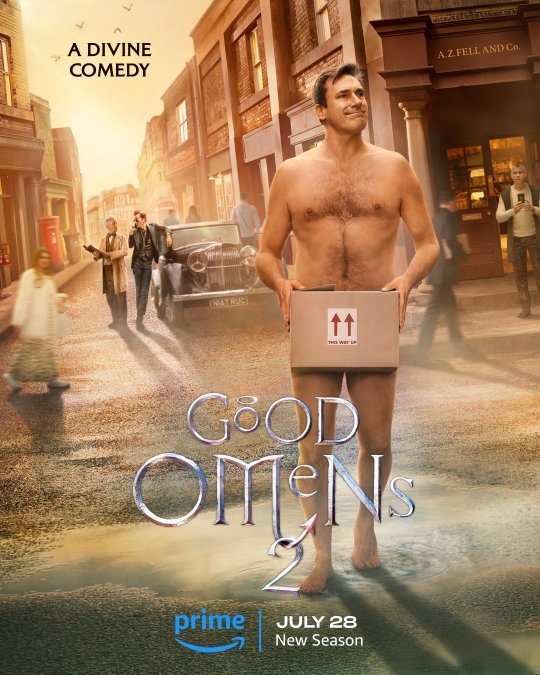
Whether or not you think Gabriel actually has an Effort of any kind in this scene, it's a dick in a box joke. Dicks go in boxes. Boxes are for sex.
("I am in the fly" wrote Gabriel)
Boxes (which are gross matter) are scary to Heaven and Hell! Michael is afraid to touch the matchbox, Dagon tries to physically protect Shax, Furfur, and Beelzebub from the bigger box in the finale. Shax and Furfur are also moving back, but not Beelzebub, which tracks. Beelzebub doesn't need to be afraid of their own relationship with Gabriel.
Heaven and Hell as institutions very much are opposed to those connections and to the representations of them.
16 notes
·
View notes
Note
I mean, sometimes an oxrib *is* just an oxrib. Like to me! The oxrib's an oxrib not a sexual metaphor and almost any other response to looking for a receptive body could've been just *so* bad. 😆 Not mutually exclusive! 😁
mhm, and i completely agree!💕 right so im gonna take this a little seriously for a moment, because im a bit worried that i might have caused offence (tone reading is really not my strong suit).
look, im not at all disputing that the text is positing that the ox-rib scene is literally a depiction of a) aziraphale being tempted for the first time, b) that temptation being to enjoy an earthly pleasure (that pleasure being food), and c) it's the/at least one origin of one of the most compelling and identifiable aspects of aziraphale's characterisation as we know it in modern day. what the text says, alone, has multiple layers of symbolism, and i do think they bear their own weight without any sexual filter placed upon it. 100%, the ox-rib is quite literally, sometimes, just an ox-rib.
equally, what i am saying is that i think that there is a justifiable interpretation of sexual subtext in it, also. im not saying that's the only interpretation (like i said in the tags of the previous ask - not at all the only one) nor am i saying it's the correct one, but i think it's one that is persuasive on its own merit. so, when i joked about neil with his "just an ox-rib" tag, im saying whilst - yes - that may not be the text, he's clearly able to recognise innuendo/sexual subtones by nature of his avoidance of it for crowley's line in s1. hence, i simply found it funny that his response from that ox-rib ask, and the corresponding tag, implied that the subtone was not there at all in the job minisode.
i get why he might not confirm the sexual undertone, if he does in fact recognise that there is one. im literally just having a laugh about it, and i maybe thought that had been a bit more obvious than it was. in any case, well - maybe he didn't recognise that subtext, or thinks that particular interpretation is perhaps a bit contrived. maybe he did recognise it, but didn't want to confirm it as to not invalidate or dismiss anyone's - or any community's - interpretation of the scene/minisode as a whole (which i think is the more likely and imo, in all seriousness, is the best way to have responded to that ask to ensure all hcs/interpretations can be considered valid because... well, they are all valid). or maybe he's just fucking about in general because he can. any road, i do recognise the text of the scene without the sexual filter on it... i just thought the situation was funny 💕
10 notes
·
View notes
Text
I wrote another Good Omens fic! This one has actual smut in it.
Who knew that finally having that surgery that had been hanging over my head for the past six months would get the creative juices flowing again? (Also helps that I'm too tired to do much else.)
Enjoy! <3
6 notes
·
View notes
Text
when you’re watching the ox rib scene you’re like i think this is a metaphor for sex or would be if i didn’t go through All That and then crowley and aziraphale kiss and you’re like holy shit it was a metaphor for sex and then you log onto tumblr dot com with all their phds in media literacy to see people asking what the fuck the ox rib scene meant.
13 notes
·
View notes
Note
Speaking of underrated horny metaphor moments... Aziraphale directing Crawly directing the fake birth via oxribs after the oxrib night... HELLO?! My eyes just about popped out of my head XD.
So very horny and so very ridiculously funny. I swear that if you don't completely lose it laughing at "Remember me? BILDAD THE SHUITE!", I don't even want to know you lol. Very early Aziraphale being that dry and dirty was hilarious. He's such trouble. :) We all go on about the ox ribs in the cellar and in the scene with the angels (as we should lol) but I think the inbetween hours get ignored and they're equally underrated...
They're on a walk together in the middle of the night when they happen upon God speaking to Job. They snuck out of the cellar after the rain had stopped but while it was still night and they wouldn't be noticed to go for a walk together alone and then, later, once it's daylight, we see Aziraphale arrive late for the angels arriving to "lo, behold, we murdered your kids!" Job and Sitis. At first, we think he's late to the meeting because he and Crowley have been hatching out a plan but oh no no no no lol... they do not have a shred of a plan. Aziraphale basically make the whole thing up in the moment Bildad busts in. Aziraphale's entire plan was 'um maybe find a way to fake rebirth the old kids or something idk' and when Crowley comes in, he now has the help he needs to actually do it, but it's *very* clear that they had absolutely no plan going into the meeting.
"It would be helpful if you were an expert in human births?" says the angel who might have wanted to mention that at some point-- ANY POINT lol-- in the last, like, 14 hours that they've had to work out this plan, now forcing Bildad to try to sell 'professional midwife/cobbler' to Michael (and sell he does lol.)... My point is that if they left to take a late night walk together and then both were outside when the angels appeared to Job and Sitis, then they stayed out all night together, during which time they were not making a plan and then Aziraphale was late to work. They went on a walk to look at the stars and the stormy sky and talk some more and find a somewhat secluded place they could then watch the sunrise together. Maybe somewhere at the beach where they are at the end of the minisode. They nearly made Sitis have seven! more! children! because they lost track of time making out lol.
If you run into that guy you've got all that chemistry with and then spend the next day helping each other with work in between flirting, getting dinner, staying up all night talking, going for a romantic stargazing walk in the aftermath of a storm, watching the sun come up together, losing track of time and nearly missing work because you're so into one another, and then meet up later at the beach and basically have your conversation confirm what you already know, which is that you're soulmates, well... that's a good first date, yeah?
It is a little sad though when you consider that the episode prior to this is 2.01, which is heavy on the emphasis of how Crowley doesn't stay overnight in the bookshop as part of their efforts to keep their relationship quiet. (That the first night we know of that he ever does, later in the week, is without Aziraphale and with Gabriel, is absolutely the stuff of Crowley's dreams and by that I mean his nightmares. Poor guy just wants to kiss the angel and it's always Gabriel or a statue of him getting in the way lol.) The Job minisode might still be one of the only times they've managed to be together all night.
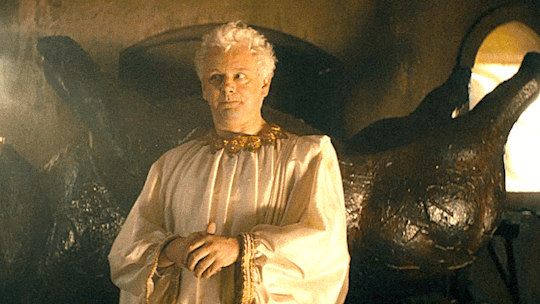
90 notes
·
View notes
Text
The weirdest thing I've see today is probably people arguing if the ox ribs scene thingy is sexual or not, going as far as to ask the author about it (that he actually chose to respond to that is weird per se lmao I'm sure in 10000 asks something more interesting could have been found, surely? What a time line to be alive). Like, people, dudes: who cares? I see people using their asexuality to feel holier than thou and saying people who interpreted it as a sexual metaphor are creeps (as a demi, can I say this stance is annoying? You're not a saint just because you don't like sex. Asexuality is not radical Christianity ffs). I see people saying that who doesn't see it as sexual is a dumbass and blind as a bat: again, let people have their ideas??? Stop bothering the author with these things??? Please, I beg of you, I'm this close to blocking him because this is like the 4th ask about sex or whatever that graces my dash just today and there's so much IInd hand embarrassment I can take.
#you all know the drill anyway#it's a love story!#they're in love!#it's all gonna be fine!#they're Ken dolls!#the end#not tagging this anything official because enough discourse is enough#also I lied#this is actually the IInd weirdest thing I saw today#the person who said Aziraphale is gonna *ahem I quote* 'eat meat out of crowley's ass' definitely takes the cake#jesus christ this fandom needs to chill#babbelbabbles
15 notes
·
View notes